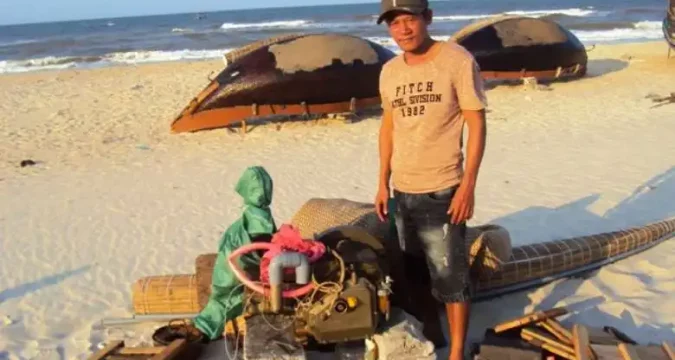
DONG HA (UCAN): John Nguyen Cong Ngan is taking apart his six-metre-long fishing boat to dock it in a harbour as he can no longer afford the cost of fuel, which has risen since the war in Ukraine began.
The fishing harbour near his home in the Gio Linh district of Quang Tri province, usually bustling with commercial activities, wears an empty look in peak season except for the few men still catching fish.
Nguyen, who is 43-years-old, will be storing the diesel engine and fishing equipment at home, flipping the boat upside down the boat on the sandy shore where many other boats are already placed.
“We are bitterly disappointed that we could not earn enough money to put food on the table while we are in the fishing season,” said the skilled fisherman, whose tanned skin indicates he’s been catching fish long enough.
But this year he made only one trip and incurred a loss of a million dong ($342,800) on fuel alone.
Nguyen said the price of auto diesel had shot up to 25,268 dong [$8.6] per litre on March 11, up from 17,579 dong [$6.00] last December, while the prices of 95 octane petrol and kerosene went up by 6,529 dong [$2.24] and 7,400 dong [$2.54] respectively.
We are bitterly disappointed that we could not earn enough money to put food on the table while we are in the fishing season
Fuel prices have topped the previous peak reached in 2014.
“The hike in fuel prices imposes a heavy burden on low-income families like us and deprives us of our daily food,” Nguyen said, adding that the prices of all essential goods had also gone up as a result.
Last year he and two workers caught 110 kilograms of herring and anchovy, daily, in the waters of Cua Viet and sold the fish for 11,500-19,000 dong [$3.94-6.50]. per kilogramme He earned 400,000 dong [$137.13] after paying the workers and fuel costs.
To add to Nguyen’s woes, traders this year are buying herring and anchovy for 5,000-7,000 [$1.71-2.40] dong per kilogramme, as local fish sauce factories have shut down due to the Covid-19 pandemic raging through the country. His catch has mostly been going into fish sauce production.
His wife works as a dressmaker at home and now plans to look for manual jobs in Dong Ha to support their two children.
His Gio Viet commune is home to 250 fishermen, most of whom have stopped fishing and are looking for other means to earn a living.
Nguyen Van The, a 54-year-old fishing boat owner from the Gio Linh district, said he landed good catches this season but still made losses. He owes one million dong to a fuel seller while being forced to borrow money to buy food for his family.
I do not have a clue when I can pay off my debts if the pandemic continues and fuel prices do not drop
He started working at a construction site and earns 300,000 dong [$102.8] a day. “I do not have a clue when I can pay off my debts if the pandemic continues and fuel prices do not drop,” he said.
Many children from fishing communities have dropped out of school and are working to support their families.
Le Thi Tuyet, a ninth-grader, said she started working at an onion shop in Gio Viet market last week after her father lost his job.
“I earn 50,000 dong a day to buy food for my family office,” she said, adding that four other children too were employed in the shop.
Nguyen Van Trung, director of the Department of Fisheries Exploitation, said some 10,000 fishing vessels and boats have come ashore due to rising fuel prices caused by Russia’s attacks on Ukraine, the prolonged Covid-19 pandemic and a steep drop in prices of fishing products.
Dam Thi Danh, one of 150 traditional fish sauce producers in Cua Viet who alone buys some 27 tonnes of fish annually, said she has had to stop production because of the pandemic, poor catches and unseasonably wet weather.
Father James Tran Dinh Hoa, the 47-year-old parish priest, said the parish serves 2,000 Catholics, over half of whom survive on fishing incomes. It was helping 200 households with essential food supplies as well as clothes and stationery.
The priest said the government should control fuel prices to secure the livelihoods of the local fishermen, which had been badly affected since February.








